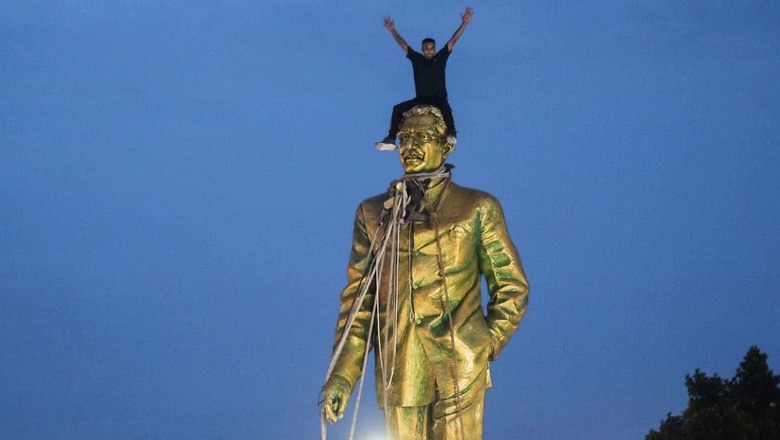
views
As Sheikh Hasina’s 15-year rule ended in Bangladesh after more than a month of deadly protests, founding father Sheikh Mujibur Rahman’s statues across the country were smashed while a museum dedicated to him was set on fire.
Some experts said the Awami League has long been centred around a cult of personality focused on Mujibur while others said the change has come at the cost of public anger towards the Father of the Nation. “It’s unfortunate that the change in #Bangladesh has come at the cost of this where a man is hitting the statue of its founder Sheikh Mujibur Rehman with a shoe. I hope this revolution doesn’t turn into space for religious extremism — a case in point is that of Pakistan…” said Pakistani journalist Bilal Farooqi.
It's unfortunate that the change in #Bangladesh has come at the cost of this where a man is hitting the statue of its founder Sheikh Mujibur Rehman with a shoe. I hope this revolution doesn't turn into space for religious extremism — a case in point is that of Pakistan… pic.twitter.com/eKinmsp9Mp— Bilal Farooqi (@bilalfqi) August 5, 2024
Mujibur’s popularity soared immediately after he led Bangladesh to independence in 1971. Also known as ‘Bangabandhu’, he was, however, assassinated in August 1975. Senior journalist and researcher Zulkarnain Saer said in 1975, Mujib established a one-party system, banning newspapers and dissolving opposition parties.
Across multiple locations in Bangladesh, people were seen demolishing statues of Sheikh Mujibur Rahman, the father of Prime Minister Sheikh Hasina. The @albd1971 , has long been centered around a cult of personality focused on Sheikh Mujibur Rahman. Revered as the nation's… pic.twitter.com/xvLz8ZQcZM— Sami (@ZulkarnainSaer) August 6, 2024
“This autocratic shift drastically eroded his public support and culminated in the tragic assassination of Mujib and his entire family,” he wrote in a post on X.
He further said Hasina’s government, too, followed a similar trajectory when it came to power for the second time in 2008. She attracted widespread criticism for implementing the draconian Digital Security Act, abolishing the caretaker government system, and allowing unchecked corruption to spread, he added.
“The opposition parties have been rendered almost non-existent, with hundreds of thousands of @bdbnp78 and @BJI_Official members imprisoned on what are widely considered to be false charges. Hasina established total control under the guise of democracy, only to find herself facing a fate similar to the one she once dictated for others — forced to flee the country,” Saer said.
Late on Monday (August 5), Bangladeshi President Mohammed Shahabuddin ordered the release of prisoners from the protests, as well as former PM and key opposition leader Khaleda Zia, 78. In poor health now, she was jailed by her arch rival Hasina for graft in 2018.
(With agency inputs)
Catch the latest developments on Bangladesh Unrest with our live blog.




















Comments
0 comment